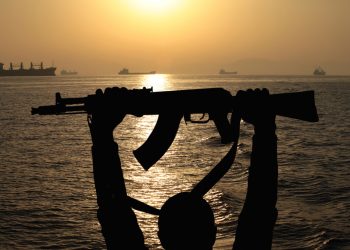On 21 April, suspected pirates seized a fishing dhow off the coast of Somalia, holding 23 people hostage. In a few hours, the European Union’s counter-piracy force EU NAVFOR Somalia Operation Atalanta had responded to the attack. Two days later, the incident had ended, with Operation Atalanta detaining five suspects and releasing the 23 hostages.
The incident started as five suspected pirates captured a fishing dhow off Somalia. The suspects navigated the dhow along the coast, and visited a pirate base camp to reinforce their crew with more members.
After that, using the captured dhow as a mother ship, the suspects attacked another fishing vessel, the FV Adria. This attack occurred in the Indian Ocean, about 280 nautical miles off Somalia.
[smlsubform prepend=”GET THE SAFETY4SEA IN YOUR INBOX!” showname=false emailtxt=”” emailholder=”Enter your email address” showsubmit=true submittxt=”Submit” jsthanks=false thankyou=”Thank you for subscribing to our mailing list”]
FV Adria performed evasive manoeuvres and increased its speed. Another fishing vessel, the FV Txori Argi helped the FV Adria as the suspects continued to chase the ship. After around an hour, the suspects approached both fishing vessels and attacked them with a rocket-propelled grenade. The Private Armed Security Teams (PAST) onboard the FV Adria and the FV Txori Argi responded, and the suspects retreated.
That same day, EU NAVFOR deployed its Maritime Patrol Aircrafts (MPRAs) and carried out a regional search, through which they managed to identify and track the captured mother ship.
On 23 April, along with its MPRAs, EU NAVFOR’s flagship ESPS NAVARRA was able to approach, intercept and board the captured fishing vessel. With the help of the PAST and EU NAVFOR’s various active assets in the region, Operation Atalanta controlled the situation and prevented any further imminent attacks.
Speaking about the operation, Operation Commander Rear Admiral Antonio Martorell Lacave, highlighted:
This incident clearly demonstrates that piracy and armed robbery at sea off the coast of Somalia have not been eradicated. The need for a strong maritime security presence in the High-Risk Area remains critical for the deterrence and prevention of future incidents and attacks
After the attack, Operation Atalanta called the shipping industry to be vigilant across the High-Risk Area and comply with recommended Best Management Practises for Protection against Somalia Based Piracy.
Martorell Lacave believes that the way in which Operation Atalanta handled this first piracy attack in its new OHQ is indicative of the commitment and responsibility each branch of the operation feels to their duty.
I am very confident in the capabilities of the staff in all branches of EU NAVFOR’s Operation and Force Headquarters. As we have seen with this most recent incident, we continue to provide the same level and quality of support from Rota as was previously provided in Northwood
he concluded.




























































